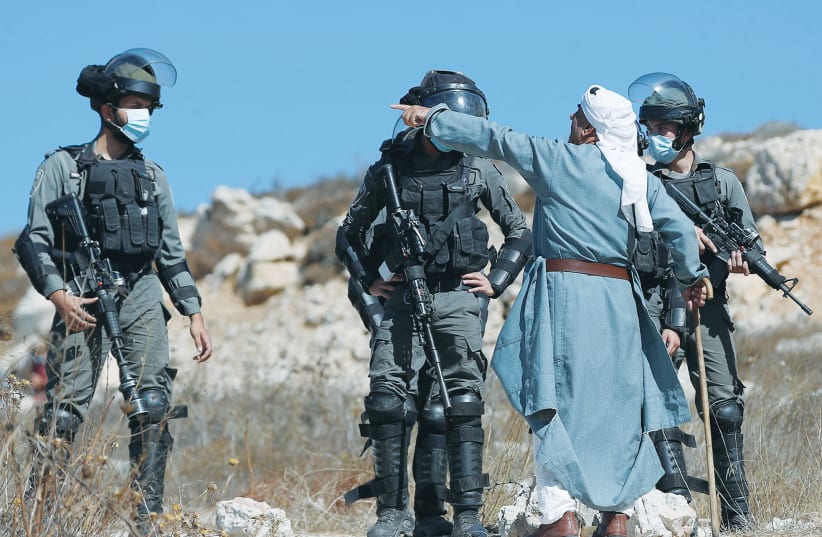The Binyamin Regional Council has called on settlers to increase their grassroots reporting on illegal Palestinian building in Area C of the West Bank, in order to crack down on the increasing phenomenon, which it said was part of the battle for area.“Citizen awareness can improve the situation,” Binyamin Regional Council head Yisrael Ganz said at a virtual conference on the matter held late Sunday night, as he directed settlers to a form on the council website where they could report on suspected illegal Palestinian building.The international community, including the EU and the UN, is calling Israel to task for its increased demolitions of illegal Palestinian buildings, explaining that few permits are granted for Palestinian building in Area C, which is the portion of the West Bank under IDF military and civilian control. Areas A and B of the West Bank are under the auspices of the Palestinian Authority.Settlers and the Israeli Right have warned that the Palestinian Authority is creating de-facto facts on the ground to seize control of Area C, in order to ensure its inclusion within the borders of a Palestinian state.“We are losing land at rapid rate,” warned Ganz at a conference organized by his council and the right-wing NGOs Regavim and Ad Kan, which have been persistently monitoring the situation of illegal Palestinian building.“This is the most central battle that we as a council are engaged in,” Ganz stated, adding that “we at the council fully understand the greatness of the hour,” as he called on the government to redefine its role in Area C.Deputy Council head Rafol Engel said that there is already a task force of security teams and council staff to prevent illegal building, including the preventive steps of developing and surveying land, also for agriculture.“Still, it’s not enough,” he said.On the reporting front, he explained, there are ten WhatsApp groups through which Jewish residents in the Binyamin region can report on illegal Palestinian activity.In the past month, the IDF’s Civil Administration, which governs Area C, also created a special task force for this, Engel said.There were 600 civilian reports last year of suspicious Palestinian building activity in the Binyamin region, he said, of which 200 were passed on to the Civil Administration and led to 60 confiscations.The council is also working with politicians to ensure that the government takes the matter more seriously, including through an increased budget for the Civil Administration, Engel said.RIGHT-WING activist Tzvi Lax spoke of a grassroots initiative in which settlers create farms on state land for the sole purpose of protecting land from Palestinians.The activity is limited to defensive measures and not proactive ones, he said.There is often only one or two families that protect hundreds of hectares. There are 40 such farms, which he argued have done a better job of protecting state land then the settlements themselves.These farmers are “the eyes in the field,” and “are literally not sleeping at night,” he said, as he called for volunteers to help them and to provide donations.New Hope politician Tzvi Hauser, who was a former MK for Derech Eretz and the former chairman of the Knesset Foreign Affairs and Defense Committee, called on the security cabinet to hold a discussion on the best way to preserve Area C for its inclusion within Israel’s final borders. The last time a partial discussion was held on the matter was in 2019, he said.There is an erroneous idea, Hauser said, that the battle for Area C is irrelevant because ownership of the area will be determined by a peace agreement between Israelis and Palestinians. The contours of that agreement, he said, will actually be determined by Israeli and Palestinian actions on the ground now, so that it is important for Israel to ensure its control of Area C.Regavim executive director Meir Deutsch said that when it comes to the actual amount of land, which he measured in dunams (10 dunams equaling one hectare), the Palestinians are expanding their footprint at a faster rate than the Israelis.On average, he said, 13,500 illegal Palestinian structures are erected on an annual basis. In 2009, settler building in Area C covered 21,962 dunams compared to the 44,495 dunams covered by Palestinian structures. A decade later, settler construction covered 24,906 dunams compared to the Palestinian-held 78,479 dunams.One way this happens, Deutsch said, is that Palestinians build illegal modular schools and then temporary homes crop up around them.The European Union and European countries, he said, are heavily involved in helping the Palestinians control land in Area C.
Binyamin Regional Council tackles Palestinian building in Area C battle
Settlers and the Israeli Right have warned that the Palestinian Authority is creating de-facto facts on the ground.
